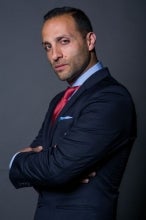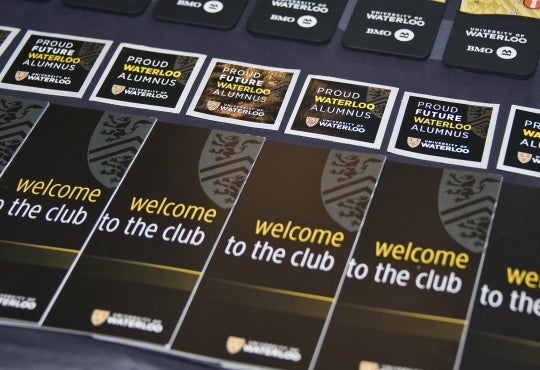While only the Chief Financial Officer of the Ultimate Fighting Championship (UFC) for less than a year, Nakisa Bidarian (BA ’01), has already led the UFC in one of the largest sports transactions in history. WME | IMG, a global leader in entertainment and sports, announced in July the acquisition of the UFC and will focus on accelerating the sport around the world.
An alumnus of the economics program at the University of Waterloo, Nakisa joined Accenture upon graduation. Nakisa also has his MBA from the Tuck School of Business at Dartmouth and started his post-MBA career with Citigroup in New York, later moving to Morgan Stanley in Dubai and the Mubadala Development Company in Abu Dhabi.
Busy in his current role as CFO for the UFC, Nakisa still finds time to give back, recently establishing the Barbad Bidarian Athletic Excellence Award in memory of his brother. This gift will provide two $4,500 awards, one to a member of Warrior Men’s Basketball and one to a member of Warrior Track & Field on an annual basis.
Alumni Relations had the pleasure of catching up with Nakisa to ask him a few questions about working for UFC, giving back, and life after Waterloo.
-----------------------------------------------------------------------------------
 Congratulations on the recent acquisition of the UFC by WME | IMG. What do you think this announcement will mean for the future of the UFC and mixed martial arts in general?
Congratulations on the recent acquisition of the UFC by WME | IMG. What do you think this announcement will mean for the future of the UFC and mixed martial arts in general?
Thank you, it was truly a great team effort, with an excellent outcome for all parties involved.
The acquisition by WME-IMG means that we will have even more resources to continue building on the global success of UFC. WME-IMG’s robust corporate presence and incredible global reach will help us further expand our reach in all markets, attract new audiences and further fuel passion for the sport of MMA.
Additionally, we are excited about WME-IMG’s core competency of building personal brands, which is important in developing mainstream profiles for a wider base of UFC athletes. I anticipate we are going to see more and more household names competing inside the Octagon in the near future. That is not only important for UFC, but plays a larger role in raising the profile of the entire sport and driving value for the athletes.
You have worked for many large-scale financial corporations from Morgan Stanley to Citigroup, how is it you came to work in such a different industry with the UFC?
The sporting industry has continued to evolve, and now a variety of skill sets are becoming applicable to having careers in the sector. Traditionally, you didn’t have mathematicians, engineers, computer-science or strategy folks in sport leagues or sport teams. Now, you have all of those people in the industry, which opens up even more opportunities for people with different backgrounds and skillsets to build a career in the sporting sector.
Did you always want to work in the sporting industry?
Growing up, I wanted to work in the sporting industry – but as a professional basketball player. Once I quickly realized those dreams would not come true, I didn’t focus on getting in the sporting sector, but I was still passionate about sports. I avidly followed a number of organizations around the globe.
My eventual path to UFC was not one that was calculated, but more based on a relationship that I had built with the previous owners of UFC: Frank and Lorenzo Fertitta. I got to know them through my time in Abu Dhabi, on the casino side of their businesses, and eventually joined them to work at the management company of Station Casinos. Based on my skill set and background, the Fertitta brothers offered me an opportunity to work at UFC back in 2012, which I was thrilled to take on.
You recently set up an athletic financial award for the University in memory of your brother; why is it important to you to give back to UWaterloo and to remember your brother in this way?
The University of Waterloo played a significant role in helping me develop as a professional. The reason I chose University of Waterloo was based on their internationally recognized co-op program, and being able to get that work experience throughout my undergraduate studies was really instrumental in making me the professional that I am today.
Looking back on my time there, I definitely wanted to give back, and I wanted to tie it to my brother, who was passionate about computer science – a field in which University of Waterloo is a leader – and mathematics as well.
Did anyone or anything at the University of Waterloo influence your career aspirations?
I always go back to my decision to go into consulting at the end of my undergraduate degree versus going into investment banking, which was my original plan. At the time, I was interviewing with several strategic consulting firms, and then I started to interview with Accenture in Canada.
I remember the partner that interviewed me, a Waterloo alum, was a gentleman who was wearing a gold chain, an earring, and his shirt’s top two buttons were open – and I thought to myself, here’s an organization where a senior leader is able to be exactly who he is and still be extremely successful. That really influenced me in choosing a path that allowed me to be the person that I am and utilize my skillset while allowing me to have my own personality. That partner and I are still friends today.
What is the most exciting aspect of working with the UFC?
It’s a fast-paced organization where we are consistently looking to deliver world-class events that serve as the backbone of our content. I love that our content is truly universal as it resonates across countries, cultures and languages, allowing us to have a meaningful presence globally. When you take a moment to pause and look back, it’s truly overwhelming the impact we have already made by building a sport that largely didn’t exist before UFC. Now, the future is just as exciting with our new ownership. There’s incredible potential to further expand UFC around the globe, and our plan is to do just that.
What advice do you have for young graduates who want to break into the often competitive professional sporting industry?
What I would suggest to those who are interested in getting into the sports industry is reaching out to whatever organizations or teams that you are interested in and try to build a dialogue with them. Look to do internships as often and as early in your career as you can and focus on the areas of expertise you want to participate in, whether that’s sponsorship, consumer products, live events, or content production. There is a wide variety of different functions within these organizations, and if you get laser focused from an early stage on what you want to do in the industry, I’m sure the opportunities will arise.






